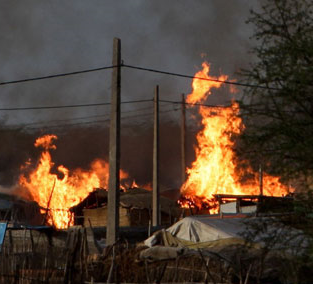Charles De Long was the U.S. Minister to Japan in 1871. After an incident in which an Okinawan vessel was shipwrecked in Taiwan and a number of its passengers murdered, De Long encouraged the Japan to falsely claim the Okinawans as Japanese wards and use the incident as pretext to wrest Taiwan away from China by force. Minister De Long assured the Japanese Foreign Minister that according to Western international law, Taiwan “would in the final analysis be subject to possession by the country successfully holding it.”[1]
Last week President al-Bashir needed no coaching on ‘Western international law’ to assure him that in the final analysis, the Abyei region of Sudan would be subject to whomever successfully held it. Under the cover of clouds, which for two days obscured the region from the cameras in low-earth orbits of Satellite Sentinel, a consortium that has been monitoring and reporting on the militarization in and around Abyei for four months, invaded the area. The Sudanese Armed Forces accompanied by Misseriya militias used aerial bombardment, tanks, and artillery to quickly rout Southern People’s Liberation Army (SPLA) forces and police from the area, terrorizing tens of thousands of civilians to flee. Eye witness accounts related scenarios similar to tactics used in Darfur: Antonov cargo planes flew over populated areas dropping bombs or incendiary devices, soldiers and militias arrived soon after in trucks firing into dwellings and at anyone who seemed to resist.
After the residents fled, satellite imagery revealed that 70% of structures in Abyei town had been torched, but not before trucks loaded with personal goods and humanitarian stores looted from homes, businesses, and storehouses. Casualty rates are not known, but it appears that civilians were not the primary targets. Residents in the area, who are largely Ngok Dinka, were not allowed to vote in the January referendum, in part because the National Congress Party wanted the nomadic Misseriya, who are aligned with north or government of Sudan, to be able to vote as well.
The 4000 square mile area that was captured is not only fertile, and thus an important grazing resource for the Misseriya, but is also known to contain perhaps as much as 25% of Sudan’s known oil reserves. The President of Southern Sudan, who also holds the title of First Vice President of Sudan, Salva Kiir, has contained the SPLM’s response to the invasion saying the south would not be drawn into war. He added, “We remain committed to peace but this should not be interpreted as cowardice.” Early reports allege that the provocation for the invasion was police forces of the SPLM firing on a government of Sudan convoy that included U.N. peacekeepers; details of this incident have not been independently verified. Prior to this incident in March and April there were several attacks by government of Sudan military forces and Misseriya militias on Ngok Dinka villages, which were razed, leading to tensions between the two armed camps just north and south of Abyei town. According to Satellite Sentinel’s observations, the region was brimming with police and military forces with tanks, attack helicopters, and light trucks used for small unit attacks sited on bases of the government of Sudan. Both sides may have been violating terms of the 2005 Comprehensive Peace Agreement.
Clearly, in the end the incentives (carrots) that President Obama had offered the government of Sudan if they permitted an orderly and peaceful secession of Southern Sudan (and whatever the international community threatened as consequences of a resort to violence), were not sufficient to intimidate a national leader already indicted by the International Criminal Court for genocide and crimes against humanity. This is the second time in three years that Abyei town has been razed by forces of the government of Sudan. This invasion appears to have effectively ‘ethnically cleansed’ the Abyei region of the Ngok Dinka, who never considered themselves allies of the ruling National Congress Party.
Under the supervision of the United Nations a new several mile wide buffer zone has been established between the north and south of Sudan, but the government of Sudan may have what it wants. Minimally, it has made a land grab of disputed territory and created a humanitarian crisis with more than 100,000 internally displaced persons (IDPs), many in need of medical care and all are desperate for food, water, and shelter. “Most of the roads in Southern Sudan are not passable during the rains and so that will make the movement of food difficult,’ World Food Programme (WFP) spokeswoman Amor Almagro told IRIN.”
In the end, it appears the Abyei region will be subject to the government of Sudan, which is successfully holding it, without major protests from the international community. President al-Bashir has seemingly given the finger to the so-called ‘community of civilized nations.’ His calculations were astute regardless of whether his actions were criminal.
Charlie Clements is Executive Director of the Carr Center for Human Rights Policy at the Harvard Kennedy School
[1] Peter Booth Wiley, Yankees in the Land of the Gods: Commodore Perry and the Opening of Japan, Viking Adult, 1990, page 81.




















